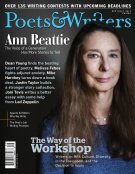The “Closed Loop” of Publishing, Hiring, and Teaching
Young: In order to get a book published, you either have to embrace your diversity aspect or you have to go the complete opposite and write white. And then, once you publish, you must continue to publish the same kinds of books, over and over. So you can see how this ties in to the academic world. You need books to get hired, but if the same kinds of books are being published, then there can form a kind of closed loop.
Haynes: The issue for African American fiction writers is not the first book—it’s the second book. Because the first book, often, even if it’s well received, it rarely becomes a big best-seller. And that’s probably true of a lot of writers—it’s an impediment for literary fiction and, in particular, writers of color.
Writers of color often publish into a critical vacuum, meaning that the reviewers and the scholars have not been responding to the work. And in academia…you do not get promoted in African American Studies by writing about contemporary literature. And actually, you don’t get promoted in literary studies at all by writing about contemporary literature of any kind.
That’s a problem in terms of the ongoing development of the writer, because there’s no conversation being had about the aesthetic, about where the work is going. When that conversation becomes closed inside a community...it can be successful, but it can also become insular.
Navigating Identity In the Workshop
Young: There’s a word that I absolutely despise: universal. That almost invariably means “the majority culture.” It doesn’t mean “universal,” as in everyone. What it means is, “make it more like this, in order to be universal.”
It’s a setup for students of color, who are also told to be authentic…you’re being told to be authentic, but if the detail you include is too specific, it’s not “universal.” So that sets up a weird binary that’s not useful. If for me to be universal I have to be white, I can never be universal.
Haynes: [Let’s say] I’m the workshop leader, and I have a student who’s bringing very specific cultural material to the table. And the conversation comes up: “Well, I don’t understand what that means, so there needs to be a sentence in this story to explain it or to translate that.” Is it the institution’s job to have instructors in place who can help that student of color navigate that, or is that a personal problem?
The “given” response is, “Well, you’ve got to make that ‘accessible’ to ‘everybody.’” But should the institution be prepared to instead say, “Let’s talk about these broader issues of translation”? And if you do it, how to do it?
If the institution isn’t prepared to help that student navigate these questions of translation, the institution has not only failed that student but also all the other students in the program who they are supposedly preparing to go out and teach other students.
Jordan: I would want the institution to create a safe space for students to talk about whatever their subject is in their poem or story, and for them to be able to express their identity. Lorraine Hansberry talks about “the universality of specificity.” She’s saying that you don’t have to be poor, black, and on the South Side of Chicago in 1959 to experience what’s happening in Raisin in the Sun. When I read Chekhov, Joyce, Faulkner—people who have a very specific cultural identity in their work—that’s “the other” to me. [I’m] reading it through this lens of “the other,” but we’re considering it from the standpoint that it’s valid. That’s what’s important—that when [a student] brings work to the workshop, and it has that cultural identity within it, it still has to be seen as valid.
Rage and Fear in Challenging Institutions
Haynes: One of the striking things about Junot’s post was the level of rage. The rage is about the difficulty of institutional change. Institutions—and particularly academic institutions—are by their nature conservative entities.
Youn: I think there is a space for rage in the wider culture that doesn’t necessarily translate into the academic culture. No one wants to be the “angry ethnic person.” It’s not going to help you get jobs and it’s not going to help you make friends. It takes writers with international stature or tenure in order to have the privilege to exert rage.
Haynes: My inner response to last summer’s student meeting was, “Be careful. Don’t get yourselves in trouble.”
Chang: Which is interesting, because there’s a huge emphasis on collegiality in academia. It’s a mentoring instinct. I’ve always felt that MFA programs are the opportunity to make representation more diverse. It’s a time in the life and artistic development of writers when these ideas are especially important. [The students] are sort of “fighting against the father,” and they’re going to “kill the father.” So it’s a great time to start these conversations. If it’s going to change, it’s going to change here.
Sonya Larson is a writer whose short fiction has appeared most recently in West Branch, Del Sol Review, the Red Mountain Review, and the Hub. She is at work on a novel about Chinese families living in the swamps of 1930s Mississippi. She is assistant director of the Muse and the Marketplace conference and is studying fiction at Warren Wilson College.








